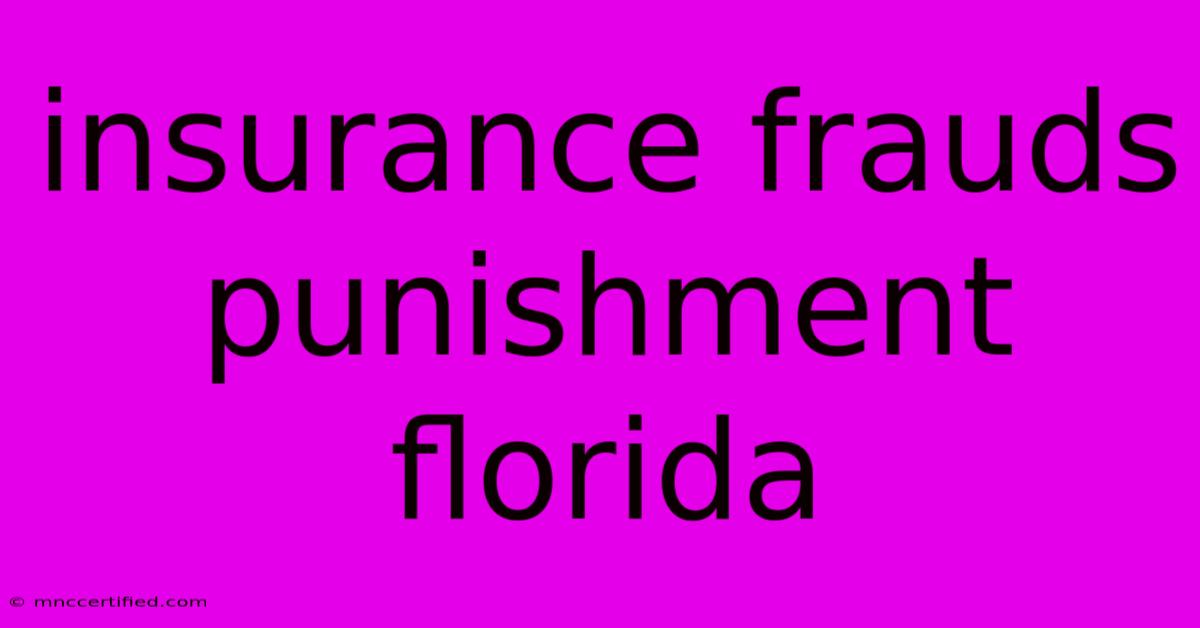Insurance Frauds Punishment Florida

Table of Contents
Insurance Fraud in Florida: Understanding the Consequences
Florida is a hotbed for insurance fraud, with the state ranking among the top for this type of crime. The consequences of committing insurance fraud in Florida are serious, ranging from fines to imprisonment. This article will delve into the different types of insurance fraud in Florida, the penalties involved, and how you can protect yourself from becoming a victim.
Types of Insurance Fraud in Florida
Insurance fraud can take many forms, but some of the most common in Florida include:
- Staged Accidents: This involves intentionally causing an accident to collect insurance payouts. Examples include fake car accidents, staged slip and falls, and fake burglaries.
- False Claims: This involves filing a claim for an event that didn't happen or exaggerating the extent of damages. For example, claiming your car was stolen when it was simply lost, or exaggerating the cost of repairs after a minor accident.
- Arson: Intentionally setting fire to property to collect insurance money is a serious crime with severe penalties.
- Ghost Employees: This scheme involves creating fake employees to collect workers' compensation benefits.
- Premium Fraud: This involves lying about personal information to get lower premiums, or failing to pay premiums while still expecting coverage.
Penalties for Insurance Fraud in Florida
The severity of penalties for insurance fraud in Florida depends on the type of fraud committed, the amount of money involved, and whether there are any aggravating circumstances.
Here's a general breakdown of the potential penalties:
- Misdemeanor: First-degree misdemeanors are punishable by a maximum of one year in jail and a $1,000 fine.
- Felony: Second-degree felonies carry a maximum sentence of 15 years in prison and a $10,000 fine. This applies to cases involving more than $20,000 in fraudulent claims.
- Additional Penalties: In addition to jail time and fines, convicted individuals may face other consequences such as:
- Loss of driver's license
- Restitution to the insurance company
- Prohibition from working in the insurance industry
Protecting Yourself from Insurance Fraud
While insurance fraud is a crime committed by individuals, you can take steps to protect yourself and your business from becoming a victim. Here are a few tips:
- Be cautious of unsolicited offers for insurance: Be wary of companies or individuals who contact you with deals that seem too good to be true.
- Research insurance companies before buying a policy: Check the company's reputation and financial stability. Look for reviews and ratings from reputable sources.
- Report suspicious activity: If you suspect insurance fraud, report it to your insurance company and to the Florida Department of Financial Services.
- Be aware of common fraud schemes: Educate yourself about the different types of insurance fraud and be on the lookout for suspicious signs.
Conclusion
Insurance fraud is a serious crime with significant consequences. By understanding the different types of fraud, the penalties involved, and how to protect yourself, you can help prevent this crime from happening in your community. Remember, reporting suspicious activity is crucial in combating insurance fraud.
Keywords: insurance fraud, Florida, penalties, staged accidents, false claims, arson, ghost employees, premium fraud, protection, reporting

Thank you for visiting our website wich cover about Insurance Frauds Punishment Florida. We hope the information provided has been useful to you. Feel free to contact us if you have any questions or need further assistance. See you next time and dont miss to bookmark.
Featured Posts
-
Gaetz Nominated As Attorney General By Trump
Nov 14, 2024
-
Wembanyama Sets Career High With 50 Points
Nov 14, 2024
-
Wednesday Season 2 Lady Gaga Confirmed
Nov 14, 2024
-
Skai Jackson Speaks Out On Partners Allegations
Nov 14, 2024
-
Edinburgh Zoo Baby Red Panda Dies
Nov 14, 2024